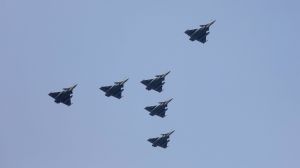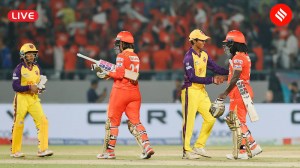The prickly dragon
The Olympics are an irresistible stage for athletes8212;but also for those who wish to act out their grievances before the...

The Olympics are an irresistible stage for athletes8212;but also for those who wish to act out their grievances before the world. While Chinese leaders furiously insist they8217;re not, and should not be, 8220;political,8221; these Olympics promise to become one of the most charged in history. Rarely has a more varied array of contentious issues crystallised around a single sporting event.
China is bedeviled by internal problems8212;human-rights violations, media censorship, corruption, pollution, labor abuses and lack of due process, to name a few. Several 8220;domestic8221; issues 8212; Tibet, Taiwan and Hong Kong, have also regularly spilled over into the international realm. By dealing with pariah states like Burma, Sudan, Zimbabwe and Iran in order to feed the country8217;s voracious appetite for oil, timber and metals, Chinese leaders have been accused of playing an irresponsible global role. Their critics would like nothing more than to flay Beijing before a worldwide television audience of hundreds of millions.
Chinese officials are doing everything possible to block such protests. They8217;ve designated three remote sites in Beijing in which to corral a few neutered 8220;demonstrations.8221; Rarely have the Chinese military and police been more anxious or at a higher state of alert. Indeed, the whole bureaucratic structure of the Chinese government and party seems coiled like a spring, ready to release into action if any errant soul emerges to make a disturbance, or even express unacceptable views, in a public way.
The Beijing Games present a fraught and sensitive moment. China has made a Herculean effort to prepare the way for this spectacle, in which ordinary Chinese, not just their leaders, can announce themselves to the world as having regained their national greatness. Protests would almost certainly spark the kind of nationalist and autocratic backlash that they8217;re meant to remedy. Remember what followed the 1989 Tiananmen demonstrations8212;a nearly 20-year period of reaction and restoration from which China has still not recovered.
This proud prickliness has deep historical roots that involve China, the West and even Japan. The most critical element in the formation of China8217;s modern identity has been the legacy of the country8217;s 8220;humiliation8221; at the hands of foreigners, beginning with its defeat in the Opium Wars and the shameful treatment of Chinese immigrants in America. Tokyo8217;s invasion and occupation of the mainland during World War II was in many ways psychologically more devastating than Western interventions because Japan was an Asian power that had succeeded in modernising, where China had failed.
This inferiority complex has been institutionalised in the Chinese mind.
Sun Yat-sen, for instance, described China in 1924 as being 8220;a heap of loose sand8221; that had 8220;experienced several decades of economic oppression by the foreign powers.8221; And when the People8217;s Republic of China was founded in 1949, Mao Zedong declared, 8220;Ours will no longer be a nation subject to insult and humiliation.8221; This was especially true during the 1960s, when non-Western countries vied with one another to appear the most 8220;oppressed8221; by imperialism, and thus the most authentically revolutionary. But it has continued to the present day. In 2001, the National People8217;s Congress passed a law proclaiming an official 8220;National Humiliation Day.8221;
The Chinese themselves have made the search for a more self-confident, less-aggrieved persona harder. For much of the past 100 years China has been engaged in a series of assaults on its culture and history. By the 1930s and 1940s, these attacks began to turn against Chinese nationalists. Chiang Kai-shek and his Wellesley-educated Christian wife were criticised for, among other things, being too Westernised. Then, after Mao8217;s communists had spent three decades trying to fashion a new revolutionary identity for China, Deng Xiaoping came along and performed yet another act of demolition, this time on the revolution itself.
The failures of these successive efforts at self-reinvention have cast the Chinese adrift, with an uncertain sense of cultural and political direction. Take the reaction to the anti-Beijing protests this spring in Tibet, and later around the world as the Olympic torch made its way to China.
What made the Tibet protests such an affront to so many Chinese was the timing: China had finally allowed itself to imagine that its national identity might metamorphose from victim to victor, thanks to the alchemy of the Olympic Games. In one grand, symbolic stroke, a successful Games was meant to cleanse China8217;s messy historical slate, overthrow its legacy of victimisation and allow the country to spring forth on the world stage reborn.
Ironically, on the surface China has never seemed more 8220;equal8221; to the West. Anyone arriving in Beijing is bound to be impressed by the magnificent new Norman Foster-designed Capital airport. The Beijing Olympic Park, with its Herzog 038; de Meuron-designed 8220;bird8217;s nest8221; stadium and its bubble-skinned, transparent National Swimming Center, is stunning.
Yet few Chinese of my acquaintance have allowed themselves to be psychologically convinced by China8217;s success, to believe truly in China8217;s establishment as a leading nation. To do this, I suppose, they would have to be convinced that they already are, in fact, successful and powerful; that the world has already begun to look on their country with a growing sense of wonder, even envy, and that the past is, in fact, the past.
- 01
- 02
- 03
- 04
- 05































